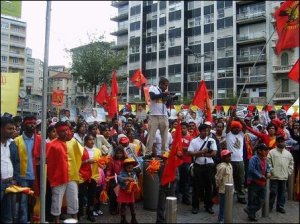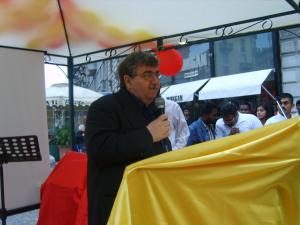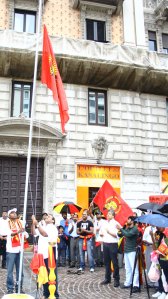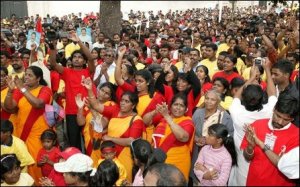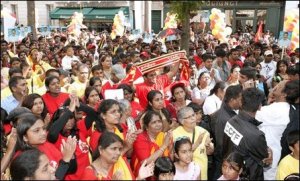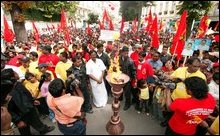Source : freemediasrilanka
In a recent editorial posted on the Defence Ministry website, the Ministry has set forth its views and suggested guidelines with regard to reporting of military-related matters. While it is not clear whether this offensive editorial is a representation of official government policy, its content represents in intent and effect the imposition a framework for self-censorship on the media.
In remarks that have come to characterise the attitude of this government in general and the Ministry of Defence in particular in relation to media freedom, the editorial argues that media scrutiny in the public interest and open discussion about important military-related issues are inimical to national security, tantamount to supporting terrorism, and can therefore be labelled as acts of treason. This lays bare the contempt and disregard for democratic values and the public interest that is at the heart of the government’s prosecution of its war on terror. The editorial is explicit in revealing the position of the Ministry of Defence with regard to these issues when it states that, “The final but the most serious concern the Ministry has on the defence reportage is the unethical measures that have been used to obtain information by some of these so called ‘defence analysts’ [sic]. Thus, the Ministry does not find any other word better than a ‘Traitor’ to call whoever attempts to show the soldiers as thieves or fools by making false allegations and raising baseless criticism against them [sic].” The chilling effect of the editorial’s articulation of the Ministry’s attitude in terms of tone, content, and language requires no emphasis.
It is in this context that the editorial proceeds to set out what appear to be the Ministry’s guidelines on how the media should regulate itself in regard to military-related reporting. According to these censorship guidelines, the media should not:
1. Be critical and analyse military strategies
2. Scrutinise promotions and transfers within the military
3. Question military procurements and tenders
4. Espouse/ discuss anti-war positions
5. Obtain information from military officers other than official spokespersons
The Free Media Movement (FMM) finds these prescriptions of the Ministry of Defence wholly unacceptable from the perspective of both democratic values and internationally accepted standards with regard to reporting on military-related issues. These guidelines may have been laughable in any other context, but amusement unfortunately is not a response available in the climate of fear, intimidation, and capricious violence that characterise the working conditions of media personnel in Sri Lanka today.
The guidelines are grounded in a world-view that rejects the democratic way of life and fundamental human rights, that is fearful of both open government and free discussion, and is intolerant of dissent. A free media is pivotal to transparency, accountability and good governance, and FMM clearly views these guidelines as yet another attempt to suppress this democratic space on spurious claims of protecting national security.
FMM unequivocally stands by the right of media organisations and personnel to be critical of military strategies, scrutinise military procurements, question transfers and promotions, and to discuss policy options other than war in the settlement of the ethnic conflict in Sri Lanka. FMM firmly rejects the view that such discussions constitute a threat to national security. It is our view that open and informed discussion on these matters provide the governors as well as the governed in a democracy with a better understanding of the war, the way it is carried out, and its broader implications, vital for promoting both democratic governance and peace-building in our country.
FMM therefore urges the government to withdraw these restrictions imposed on the media, and further, to make an urgent clarification as to whether they constitute elements of official government policy rather than merely the views of an editorial writer, given that the editorial under consideration, published on the Ministry of Defence website, purports to state the views of the Ministry of Defence.
Source : freemediasrilanka
Filed under: News | Tagged: military, ree Media Movement, self-censorship, Sri Lanka | Leave a comment »


